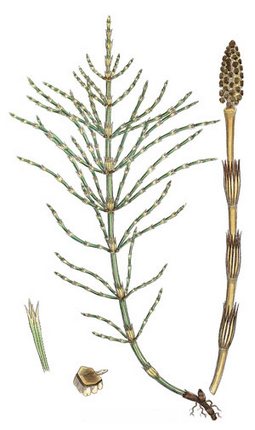Horsetail polevoy – Equisetum arvense L.
Perennial herb up to 30-40 cm, families hvoshtevыh (Equisetaceae). In Russia horsetail found almost everywhere. For medical purposes harvest the grass horsetail field.

The chemical composition of horsetail
Horsetail herb contains saponin ekvizetonin, alkaloid nicotine, palyustryn (ékvizetin), trimetoksipiridin, dimethyl, flavonoidы, ascorbic acid, carotene, organic acid (akonitovaya, apple, shtavelevaya), fixed oil, mineral salts, resin, tannins, bitterness, a large amount of silicic acid.
The pharmacological properties of horsetail
Herbal medicines horsetail on diuretic effects are superior kidney tea. Numerous studies have also established hemostatic and anti-inflammatory properties of the herbal form, prepared from grass plants. Horsetail isolated from β-glucoside, luteolin has anti-microbial and anti-inflammatory properties. The experiment found, that horsetail can have a detoxification effect, in particular it promotes the release of lead from the body. Silicic acid, dissolving in water and forming a salt, easily resorbed in the gastro-intestinal tract. The silicon compound - a necessary component in the life of the various systems of the body; they play an important role in metabolism and functional activity of the connective tissue, mucosas, the walls of blood vessels; They are particularly important for the development of bone tissue. In the urine of silicon material to form protective colloids, impeding the crystallization of certain minerals and thus hindering the formation of urinary stones.
Use of horsetail in medicine
Horsetail herbal medicines prescribed as a diuretic in stagnation cardiac origin (heart disease, heart failure), and swelling, associated with pulmonary heart disease. In these cases, the excretion of urine in patients is significantly increased even when receiving only one drug horsetail. The therapeutic effect is already apparent from the 1st day of drug administration and observed during the entire course of treatment. If re-treatment urine output increases again, which indicates the absence of habituation to herbal medicines horsetail. In diseases of the urinary tract (pielity, cistity, uretrity) Horsetail is often prescribed along with bearberry or other plants, is a diuretic and anti-inflammatory properties.
As a remineralizing agent decoctions and infusions of horsetail prescribed for elderly persons. Due to the presence of silicon compounds horsetail herb used in atherosclerosis heart and brain, inflammatory diseases of the kidney and urinary tract, urolithiasis, lesions of the capillary vessels, as well as pulmonary tuberculosis and skin during their treatment chemother vticheskogo.
Given the hemostatic properties of horsetail and its ability to accelerate the excretion of lead, horsetail drugs prescribed for hemorrhoids and uterine bleeding, acute and chronic lead poisoning.
Horsetail contraindicated in nephrotic and nephritic, because it can cause irritation of the kidneys. Water forms of herbal plants, having disinfectant properties, used for outdoor applications in chronic indolent ulcers or purulent wounds. Typically, horsetail herb is used in complex treatment fees.
Formulations horsetail, Dosing and Administration
Decoction of horsetail: 20 g (4 tablespoons) raw material is placed in an enamel bowl, Pour 200 ml (1 glass) hot boiled water, capped and heated in hot water (in a water bath) 30 m, cooled at room temperature for 10 m, filter, the remaining raw materials squeeze. The volume of the resulting broth is poured boiled water to 200 ml. The prepared broth is stored in a cool place for 2 d.
Take 1 / 2-1 / 3 cup 2-3 times a day 1 hours after meals.
The grass is stored in a cool dry place.
Liquid extract of horsetail Take 1/2 teaspoon 3-4 times a day.
Briquettes: 1,5 briquette slices pour a glass of cold water, .in boil over 30 m, cooled, filter. Is the inside of 1 tablespoon 3-4 times a day.
